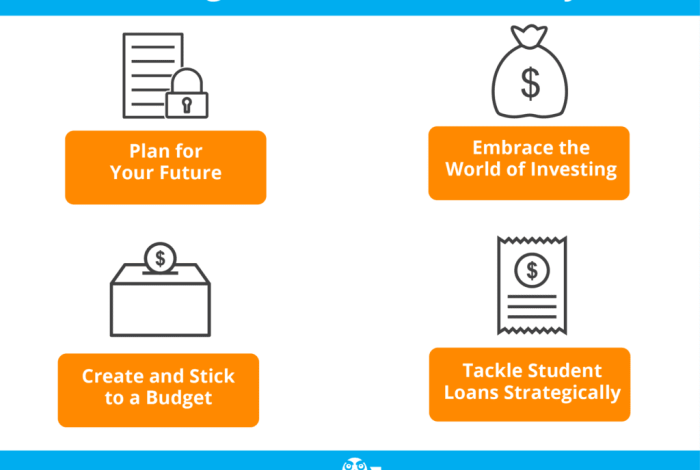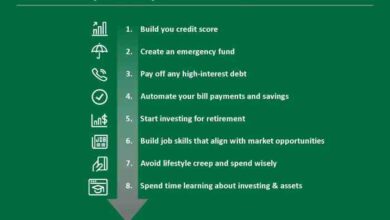
6 Essential Money Tips for Recent Graduates
6 Essential Money Tips for Recent Graduates: You’ve graduated, the world is your oyster, and the possibilities seem endless. But with that freedom comes the responsibility of managing your finances. This is a critical time to establish healthy financial habits that will set you up for success in the years to come.
Whether you’re navigating student loan debt, figuring out how to save for a down payment on a house, or simply trying to make ends meet, these 6 essential money tips are designed to help you build a solid financial foundation.
From budgeting basics to the importance of investing early, we’ll cover the key aspects of financial literacy that every recent graduate should understand. We’ll also explore the benefits of seeking professional advice and the resources available to help you achieve your financial goals.
Let’s dive in!
Budgeting Basics
Budgeting is crucial for recent graduates as it helps you manage your finances, prioritize spending, and achieve your financial goals. It’s about understanding your income and expenses, making informed decisions about how to allocate your money, and creating a plan to reach your financial objectives.
Tracking Income and Expenses
Tracking your income and expenses is the foundation of effective budgeting. This allows you to gain a clear picture of your financial situation, identify areas where you can save money, and make informed decisions about your spending. Here are some tips for tracking your income and expenses:
- Use a budgeting app: Many budgeting apps are available that can help you track your income and expenses automatically by connecting to your bank accounts. Some popular apps include Mint, Personal Capital, and YNAB.
- Maintain a spreadsheet: A simple spreadsheet can be used to manually track your income and expenses. You can categorize your expenses and use formulas to calculate your net income and spending.
- Keep receipts: Keep all receipts for your purchases, especially for larger expenses. This will help you accurately track your spending and ensure that you are not overspending.
Creating a Simple Budget
A simple budgeting method for recent graduates is the 50/30/20 rule:
- 50% of your income should be allocated to essential expenses, such as rent, utilities, groceries, and transportation.
- 30% of your income can be used for discretionary spending, such as entertainment, dining out, and hobbies.
- 20% of your income should be allocated to savings and debt repayment.
Creating a Realistic Budget
- Track your spending for a month or two: This will help you identify your actual spending habits and create a budget that is realistic and achievable.
- Prioritize your needs: Determine which expenses are essential and which are discretionary. Focus on reducing discretionary spending to free up more money for savings and debt repayment.
- Set realistic goals: Don’t try to cut your expenses drastically all at once. Start with small changes and gradually work towards your goals.
- Be flexible: Your budget should be flexible enough to accommodate unexpected expenses or changes in your income.
Sample Budget Table
| Category | Income | Expenses | Savings |
|---|---|---|---|
| Salary | $3,000 | ||
| Rent | $1,000 | ||
| Utilities | $200 | ||
| Groceries | $300 | ||
| Transportation | $200 | ||
| Entertainment | $200 | ||
| Savings | $600 | ||
| Debt Repayment | $200 |
Managing Debt
As a recent graduate, you’re likely facing a new reality: managing your own finances, which includes tackling student loans and other potential debts. Understanding how to manage debt effectively is crucial for your financial well-being and future stability.
Types of Student Loans and Repayment Options
Student loans are a common form of debt for recent graduates. There are various types of student loans, each with different repayment options.
- Federal Student Loans: These loans are offered by the U.S. Department of Education and generally offer more favorable terms than private loans, including flexible repayment options, income-driven repayment plans, and potential loan forgiveness programs.
- Private Student Loans: These loans are offered by banks, credit unions, or other private lenders. They may have higher interest rates and less flexible repayment options than federal loans.
- Standard Repayment Plan: This is the most common repayment plan for federal student loans, requiring you to make fixed monthly payments over a 10-year period.
- Graduated Repayment Plan: This plan starts with lower monthly payments that gradually increase over time.
- Income-Driven Repayment Plans: These plans base your monthly payments on your income and family size. Some plans may even forgive remaining balances after 20 or 25 years of payments.
- Extended Repayment Plan: This plan allows you to spread out your payments over a longer period, up to 25 years.
Credit Score and Borrowing Costs
Your credit score is a numerical representation of your creditworthiness. Lenders use it to assess your ability to repay loans. A higher credit score indicates a lower risk to lenders, leading to lower interest rates and better borrowing terms.
A good credit score can save you thousands of dollars in interest payments over the life of a loan.
Minimizing Credit Card Debt
Credit cards can be convenient but can also lead to significant debt if not managed responsibly. Here are some tips for minimizing credit card debt:
- Use Credit Cards Wisely: Only use credit cards for purchases you can afford to pay off in full each month.
- Pay More Than the Minimum: Aim to pay more than the minimum payment to reduce your balance faster.
- Transfer Balances: Consider transferring your balance to a credit card with a lower interest rate.
- Negotiate with Credit Card Companies: You may be able to negotiate a lower interest rate or a reduced minimum payment.
Debt Management Strategies, 6 essential money tips for recent graduates
There are various debt management strategies that can help you get out of debt. Here’s a table comparing some common options:
| Strategy | Pros | Cons |
|---|---|---|
| Debt Consolidation Loan | Lower monthly payments, potentially lower interest rate | May extend the repayment period, could increase total interest paid |
| Debt Snowball Method | Motivating to see progress, can help you build good financial habits | May take longer to pay off high-interest debt |
| Debt Avalanche Method | Prioritizes high-interest debt, saves money on interest | Can be demotivating if you have a large balance on a high-interest debt |
| Debt Management Plan | Professional guidance, may lower interest rates | Can impact your credit score, fees may apply |
Saving and Investing
As a recent graduate, you’re likely focused on starting your career and building your financial independence. While it’s tempting to spend your hard-earned money on new experiences and gadgets, it’s crucial to prioritize saving and investing for a secure financial future.
Building an Emergency Fund
Having an emergency fund is essential for financial stability. It acts as a safety net to cover unexpected expenses, such as medical bills, car repairs, or job loss. Aim to save three to six months’ worth of living expenses in a high-yield savings account.
Figuring out your finances as a recent graduate can be overwhelming, but having a solid plan is key. Budgeting, saving, and investing are all essential, but you might also want to consider exploring the world of cryptocurrencies. While Bitcoin is the most well-known, Ethereum is gaining popularity.
If you’re curious about the differences between the two, check out this article on how Ethereum is different from Bitcoin. Understanding the basics of crypto could be a valuable addition to your financial knowledge, but remember to prioritize the fundamentals like budgeting and saving first!
Saving Money on a Tight Budget
Recent graduates often face financial constraints. Here are some practical tips for saving money:
- Track your spending:Use budgeting apps or spreadsheets to monitor your income and expenses. This helps identify areas where you can cut back.
- Cook at home:Eating out frequently can drain your budget. Cooking at home is a cost-effective way to save money on meals.
- Negotiate bills:Contact your service providers (internet, phone, cable) to negotiate lower rates or explore alternative plans.
- Take advantage of discounts:Look for student discounts, coupons, and promotions to save money on everyday purchases.
- Reduce unnecessary subscriptions:Cancel unused streaming services, gym memberships, or subscriptions you no longer need.
The Benefits of Early Investing
Investing early offers several advantages, primarily due to the power of compound interest. This concept allows your investments to grow exponentially over time, as earnings generate further earnings.
“The earlier you start investing, the more time your money has to grow through compounding.”
Warren Buffett
Investment Options for Recent Graduates
Here are some investment options suitable for recent graduates:
- Roth IRA:This retirement account allows you to contribute after-tax dollars and withdraw your earnings tax-free in retirement. It’s a great option for young investors who expect their income to increase over time.
- Index Funds:These funds track a specific market index, such as the S&P 500, providing broad market exposure at a low cost.
- Target-Date Funds:These funds automatically adjust their asset allocation based on your target retirement date, making them a convenient choice for beginners.
- Robo-Advisors:These automated investment platforms offer personalized portfolios based on your risk tolerance and financial goals.
Compound Interest and Long-Term Savings
Compound interest is the key to wealth building. It’s the interest earned on your initial investment, plus the interest earned on the accumulated interest. The longer you invest, the more powerful compound interest becomes.
“Compound interest is the eighth wonder of the world. He who understands it, earns it … he who doesn’t … pays it.”
From budgeting and saving to investing and building credit, there are plenty of financial tips for recent grads. But don’t forget about the basics – securing your bank accounts is crucial! A recent Gallup survey found that a large percentage of Americans have experienced financial fraud, so it’s essential to stay informed about bank account security tips protecting finances.
By taking precautions like using strong passwords and monitoring your accounts regularly, you can protect your hard-earned money and focus on building a solid financial future.
Albert Einstein
For example, imagine investing $1,000 at an annual return of 7%. After 30 years, your investment would grow to over $7,612. This demonstrates the significant impact of compound interest on long-term savings.
Navigating the financial world as a recent graduate can feel overwhelming, but there are some essential money tips to help you stay on track. Budgeting, saving, and investing are key, but don’t forget to factor in the impact of inflation! Check out the inflation guide tips to understand and manage rising prices to get a handle on how rising costs affect your finances.
Once you understand the bigger picture, you can make informed decisions about your money, from setting realistic budgets to exploring ways to increase your income.
Financial Literacy

As a recent graduate, you’re embarking on a new chapter in your life, one that likely involves managing your finances for the first time. Financial literacy is crucial for navigating this new world, helping you make informed decisions that will lead to financial stability and success.
Understanding Key Financial Concepts
Understanding key financial concepts is fundamental to making sound financial decisions. These concepts provide the foundation for managing your money effectively.
- Budgeting:Creating a budget involves tracking your income and expenses, allowing you to see where your money is going and identify areas where you can save. It helps you prioritize spending and achieve financial goals.
- Saving:Setting aside a portion of your income for future needs, such as emergencies, retirement, or a down payment on a house.
- Investing:Putting your money to work to potentially grow over time. Investing can help you build wealth and reach your financial goals faster.
- Debt Management:Understanding the different types of debt, the impact of interest rates, and strategies for managing and paying down debt.
- Credit Scores:Your credit score is a numerical representation of your creditworthiness. A good credit score can help you qualify for loans with lower interest rates.
- Compound Interest:The concept of earning interest on both the principal amount and accumulated interest, allowing your money to grow exponentially over time.
- Inflation:The rate at which the prices of goods and services increase over time, eroding the purchasing power of your money.
- Diversification:Spreading your investments across different asset classes to reduce risk and potentially enhance returns.
The Importance of Financial Planning
Financial planning is the process of setting financial goals, creating a strategy to achieve those goals, and regularly monitoring your progress. It’s a proactive approach to managing your finances that can help you:
- Achieve your financial goals:Whether you’re saving for a down payment on a house, paying off student loans, or planning for retirement, financial planning helps you stay on track.
- Avoid financial mistakes:By understanding your financial situation and having a plan, you’re less likely to make impulsive decisions or fall into debt.
- Reduce stress and anxiety:Knowing you have a plan in place can provide peace of mind and reduce financial stress.
- Build a strong financial foundation:Financial planning is an ongoing process that helps you develop healthy financial habits and make informed decisions.
Resources for Improving Financial Literacy
There are numerous resources available to help you improve your financial literacy. Take advantage of these opportunities to learn more about personal finance and make informed decisions.
- Financial Literacy Websites:Websites such as Investopedia, NerdWallet, and the Consumer Financial Protection Bureau (CFPB) offer valuable information on a wide range of financial topics.
- Books and Articles:There are many books and articles available on personal finance, covering topics such as budgeting, saving, investing, and debt management.
- Financial Education Courses:Many colleges and universities offer financial literacy courses, and some community organizations also provide free or low-cost financial education programs.
- Financial Advisors:A financial advisor can provide personalized guidance and support to help you develop a financial plan that meets your specific needs.
Common Financial Mistakes to Avoid
As a recent graduate, you’re likely starting to make your own financial decisions. It’s important to be aware of common financial mistakes that can hinder your progress.
- Living beyond your means:It’s easy to get caught up in lifestyle inflation, spending more than you earn. Stick to a budget and avoid unnecessary expenses.
- Not saving enough:Start saving early and often, even if it’s just a small amount. Compound interest works in your favor over time.
- Carrying too much debt:High-interest debt can quickly spiral out of control. Focus on paying down debt as quickly as possible.
- Not understanding your credit score:Your credit score plays a significant role in your financial life. Monitor your credit score regularly and take steps to improve it if needed.
- Not planning for the future:Don’t wait until retirement to start planning. Think about your long-term financial goals and start saving and investing early.
Negotiating Salary and Benefits
Negotiating salary and benefits is an important part of your job search. It’s an opportunity to advocate for yourself and secure fair compensation.
- Research industry standards:Use resources like Glassdoor or Salary.com to research average salaries for your position and location.
- Highlight your skills and experience:Emphasize your qualifications and how they can benefit the company.
- Be prepared to negotiate:Have a salary range in mind and be willing to negotiate.
- Consider the total compensation package:Don’t just focus on salary. Consider benefits such as health insurance, retirement plans, and paid time off.
- Be confident and professional:Negotiate with confidence and respect, but be assertive in advocating for yourself.
Building a Financial Foundation: 6 Essential Money Tips For Recent Graduates
Building a strong financial foundation is crucial for recent graduates as it sets the stage for a secure and prosperous future. It involves establishing healthy financial habits, setting clear goals, and making informed decisions that support long-term financial well-being.
Setting Financial Goals
Setting financial goals provides direction and motivation, allowing you to prioritize your financial objectives and track progress towards achieving them.
- Short-term goalsare typically achievable within a year, such as saving for a vacation, paying off credit card debt, or building an emergency fund.
- Mid-term goalsmight span a few years, such as buying a car, making a down payment on a house, or investing in a retirement account.
- Long-term goalsare those that you aim to achieve over a longer period, such as retiring comfortably, starting a business, or achieving financial independence.
Achieving Financial Independence
Financial independence is the ability to meet your financial needs and obligations without relying on others.
- Budgetingis the foundation of financial independence, as it helps you track your income and expenses, identify areas where you can save, and allocate funds towards your goals.
- Saving and investingare essential for building wealth and achieving financial security. Regular savings allow you to accumulate funds for emergencies and future goals, while investing can help your money grow over time.
- Managing debtis crucial for financial independence, as high levels of debt can strain your finances and limit your ability to save and invest.
Building a Strong Financial Foundation
A strong financial foundation is built upon a combination of sound financial practices and strategic planning.
- Create a budget: Tracking your income and expenses helps you identify areas where you can save money and allocate funds towards your goals.
- Build an emergency fund: Having an emergency fund provides a financial cushion to cover unexpected expenses, such as medical bills, car repairs, or job loss.
- Manage your debt effectively: Prioritize paying off high-interest debt and explore strategies to reduce debt, such as debt consolidation or balance transfers.
- Start saving for retirement: Even if you’re young, it’s never too early to start saving for retirement. Take advantage of employer-sponsored retirement plans and consider contributing to a Roth IRA or traditional IRA.
- Invest for the future: Investing your savings can help your money grow over time, allowing you to achieve your financial goals more quickly.
Steps Involved in Building a Financial Foundation
Building a financial foundation is a step-by-step process that requires consistent effort and discipline.
| Step | Description |
|---|---|
| 1. Set Financial Goals | Define your short-term, mid-term, and long-term financial objectives. |
| 2. Create a Budget | Track your income and expenses to identify areas where you can save money. |
| 3. Build an Emergency Fund | Save enough money to cover three to six months of living expenses. |
| 4. Manage Debt Effectively | Prioritize paying off high-interest debt and explore strategies to reduce debt. |
| 5. Start Saving for Retirement | Contribute to employer-sponsored retirement plans and consider individual retirement accounts (IRAs). |
| 6. Invest for the Future | Invest your savings in a diversified portfolio of assets, such as stocks, bonds, and real estate. |
Seeking Professional Advice
Navigating the financial world as a recent graduate can feel overwhelming. While you’ve learned the basics of budgeting, managing debt, and saving, seeking professional advice from a financial advisor can provide valuable insights and guidance for making informed financial decisions.
Benefits of Consulting a Financial Advisor
Consulting with a financial advisor offers numerous benefits for recent graduates. A financial advisor can help you develop a personalized financial plan that aligns with your unique goals and circumstances. They can provide unbiased and objective advice, helping you avoid common financial pitfalls and make informed decisions about investments, debt management, and long-term financial planning.
Finding a Qualified Financial Advisor
Finding a qualified financial advisor requires careful consideration.
- Start by seeking recommendations from trusted sources, such as family, friends, or colleagues who have positive experiences with financial advisors.
- Research potential advisors online, checking their credentials, experience, and client testimonials.
- Look for advisors who are certified financial planners (CFPs) or chartered financial analysts (CFAs), as these certifications indicate a high level of professional knowledge and ethical standards.
- Schedule consultations with a few advisors to discuss your financial goals and understand their approach and fees.
- Choose an advisor who you feel comfortable with and who demonstrates a genuine interest in helping you achieve your financial goals.
Types of Financial Advice Available
Financial advisors offer a wide range of services, catering to various needs and financial situations.
- Investment Advice:Financial advisors can help you create an investment portfolio that aligns with your risk tolerance, time horizon, and financial goals. They can recommend specific investments, such as stocks, bonds, mutual funds, and exchange-traded funds (ETFs), and provide ongoing portfolio management services.
- Retirement Planning:A financial advisor can help you develop a retirement savings strategy, including choosing the right retirement accounts, such as 401(k)s or IRAs, and determining appropriate contribution levels. They can also provide guidance on asset allocation and investment strategies for retirement funds.
- Debt Management:Financial advisors can help you develop a plan to manage and reduce debt effectively. They can provide guidance on debt consolidation, strategies for paying off high-interest debt, and budgeting techniques to control spending and avoid future debt accumulation.
- Estate Planning:A financial advisor can help you create an estate plan, including wills, trusts, and power of attorney documents, to ensure your assets are distributed according to your wishes and minimize potential tax liabilities.
Free or Low-Cost Financial Guidance
While consulting with a financial advisor can be beneficial, it’s not always financially feasible, especially for recent graduates. Fortunately, several resources offer free or low-cost financial guidance:
- Credit Counseling Agencies:These agencies offer free or low-cost financial counseling, including budgeting assistance, debt management advice, and credit report review. They can also help you develop a plan to address credit card debt or other financial challenges.
- Non-Profit Organizations:Many non-profit organizations, such as the National Endowment for Financial Education (NEFE) and the Financial Planning Association (FPA), offer free or low-cost financial education programs and resources, including online courses, webinars, and publications.
- Financial Institutions:Many banks and credit unions offer free or low-cost financial counseling services to their customers. They may have financial advisors on staff or partnerships with external organizations that provide financial guidance.





